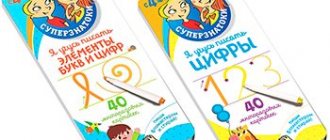Sloppy handwriting and illiterate writing are a common problem among schoolchildren. It is associated with the compaction of the curriculum and a decrease in the number of hours for teaching calligraphy and grammar. A teacher must grade the handwriting of 25-30 first-graders in just six months, and the children simply do not have time to develop the skill of beautiful and competent writing.
Parents need to help their child master this difficult science without discouraging interest in learning. This is possible, the main thing is regularity of classes.
Motivation and encouragement
First of all, the first grader needs to be convinced of the need for exercise. Arguments for you and your children:
- a person with beautiful handwriting is perceived as neat, attentive, collected, and responsible;
- Calligraphy classes develop fine motor skills, teach the child to draw conclusions and think logically;
- legible notes are easy and pleasant to read, which adds points to students in the eyes of the teacher. But for carelessness and dirt in notebooks, grades are reduced;
- mistakes often arise not from ignorance of the rules, but from haste and inattention. In this case, the low mark is doubly offensive, but you only have yourself to blame.
It is possible to improve your handwriting, and you should start studying at the first sign of deterioration. Preventive home exercises are also possible, since school calligraphy lessons are clearly not enough now.
Tips for parents:
- Do not force your child to study, but stimulate him with the advantages of such work - neat notebooks, high grades, good relationships with teachers.
- Be patient - there will be no immediate results. Do not scold, let alone punish, your first-grader, do not compare his achievements with the successes of other children - this can completely deprive him of interest in learning.
- Do not rush your child - haste worsens handwriting and leads to typos. Everyone has their own pace of learning.
- Don’t force them to redo and rewrite assignments - fatigue will make it worse each time.
- Praise for diligence and success achieved, comparing the results with previous work - this will give the child an incentive to develop.
- Give the opportunity to actively relax after classes, before doing homework and practicing handwriting: play outdoor games, take a walk in the fresh air - this will saturate the brain with oxygen and give a surge of strength.
Maya Kucherskaya , writer, professor at the Faculty of Philology of the University “Higher School of Economics”, head of the literary school “Creative writing school”
I want to make a reservation right away - I don’t work directly with children who write (my seven-year-old daughter, who constantly composes something, doesn’t count). I only supervise classes with children at our literary school, Creative writing school. And, of course, I pay very close attention to the selection of teachers for children’s workshops. And everyone who taught and teaches with us - Leonid Klein, Yulia Idlis, Oleg Shvets - are professionals who know how to carefully and delicately guide a child through the free element of creativity. Freedom and tact are our basic principles.
I’ll decipher it: a child’s imagination is limitless, unusual, no adult can come up with this, it cannot be limited, let him live freely. But for it to take shape, it needs tactful leadership, taking into account the already existing languages of culture and literature.
One of the tasks of education is to enrich, to show what you can do in this world not for your daily bread, but for joy, in order to develop - you can dance flamenco, play the flute and table tennis, study French, and you can also - look ! - to compose, write down stories about it all - dance, music, France.
For children and primary schoolchildren, creative writing classes help them try words by touch, taste, and color. They give an understanding that what is around – lilacs, cats, the sea – can not only be painted with paints, but can be painted with words. It will come out no less exciting and colorful. For children, our classes are a test of the limits of the power of words. For teenagers, everything is a little different. For them, writing is another tool for learning, understanding themselves, the world, and other people. And it makes sense to teach teenagers the techniques of writing—how to construct a narrative, sculpt a hero, and give characters their own voice.
Too often, creative children's activities for parents turn into a vanity fair - and behind the scenes, arguments and tears begin over who will get the role of the silent page, because there are five boy candidates, and four pages are needed on stage. Just the other day I had to observe these maternal tragedies, which children are so easily infected with. Listen, creativity is given to us for happiness, and not for hustle and bustle behind the scenes. And we immediately warn those parents who bring their children to our school: we simply teach children to treat the text meaningfully, to understand how to bewitch the reader (in the fall, for example, we are opening a fairy tale workshop), how to work with words, but we do not teach them to fame, success, applause, we are not a modeling agency, no.
What is the difference between a child writer and an adult writer? The child is not yet crushed by the burden of what he has read and the wisdom of others, he writes as if he was the first on earth to take up a pen, this gives him freedom and can lead to something that an adult will never invent. Therefore, many adult writers are trying to return to this state, to fall into childhood, even Lev Nikolaevich Tolstoy did not escape this temptation of childhood when he decided to write quite simply, like a child, not to mention the absurdists, Kharms and others. This experience of the primordial nature of being is an advantage of children's consciousness. But, of course, children are not very good at analyzing and comprehending, especially large-scale phenomena and historical events. Although for creativity, for creating a masterpiece, this is not always necessary.
Lev Yakovlev , poet, playwright, head of the literary “Laboratory for working with gifted children” at the Central Children's Children's Hospital named after. Gaidar (Moscow)
The laboratory at the Gaidar Library appeared five years ago, and now we essentially have two groups - older and younger (7-12 years old). There are many guys from the All-Russian competition “Magic Word”. I was on the jury, and the little ones’ manuscripts shocked me - I rode the subway, read, laughed and cried. This hasn't happened for a long time. Of course, now it is impossible to say what will come of them, but it is obvious: they are gifted beyond measure. It’s incredibly interesting to work with them, and adults - parents, librarians, writers, musicians who come to the laboratory get no less pleasure than the children themselves.
Many children are not socialized. Yes, almost everything. And it’s not easy for them at school. And they feel good here. You know, when weirdness meets weirdness, there's an understanding that it's okay to be weird. The discussion proceeds quite traditionally: first the children speak out, then me and the writer Vitaly Kaplan. Well, the chief librarian Tatyana Rudishina, and the writers who come to visit. What is unconventional is the careful stylistic work. Each child has a printed text in front of them, in which they highlight what they like and what they don’t. And they say. And rightly so – important conclusions can be drawn from these examples. Sometimes they criticize each other heatedly, but they treat each other kindly. Well, Vitaly and I communicate with them as equals, pass on our experience to them, and they pass on to us. I'm not sure that ours is more valuable.
Children should not be forced to write. This is my belief. There was a case when the parents forced the girl to write all the time, every day. Literary rape. And she gave out endless long boring texts (and started out great). I tried to explain to them that this is not necessary, that these texts do not improve the quality, but on the contrary. They stopped walking. The ending will most likely be sad. Subjugation dampens the joy of creativity.
Our boys often write absurd, funny fairy tales, but there are also wonderful poets. Girls are good at realistic stories, where there are more details, experiences, and reflections. And among them there are several poets who are extremely musical. But I think that poets need to learn to write prose, and vice versa. This develops talent and makes it richer. Moreover, it is necessary to explain to prose writers that poetry is not a rhymed story. It is better to do this by your own example. What else? It happens that I call someone early, we edit the story one-on-one (if it is short) - and they immediately edit it on the computer and then read the new text in class. This is good - because they are already praised, but they could still be scolded. Scolding can completely discourage you.
Children definitely need performances and publications - this keeps them interested in writing. They receive feedback and understand that not only they need it, but also someone else.
So far, few people want to associate themselves with literature. They do not perceive literature as a profession. Time will tell in whom this virus will take root. Now it is important that they do what interests them. And they learned to express themselves interestingly. At school it’s different: the teacher asks a question, the student answers. Moreover, he knows how to answer in order to get an A. There are no teachers or students here. At first it’s unusual for them, but then they get a taste for it. In general, I like those educational systems where children speak freely, and their opinions - on a variety of issues - are interesting to adults. Just like in our Laboratory.
Evgenia Pasternak , writer
In 2013, together with the publishing house “Pink Giraffe,” Andrei Zhvalevsky and I held a fan fiction competition for school curriculum works among teenagers 10–17 years old. Fan fiction (from the English fan fiction) is an essay based on an existing literary work.
The competition had two goals. The first is correct pedagogical. To write fanfiction, you need to read the text, not the summary. Since we asked to write fan fiction specifically based on works from the school curriculum, we hoped that we would motivate at least someone to open the book. The second goal was completely wrong - pedagogical, because we really wanted to bring down the pathos. Give an opportunity to make fun of the heroes of classical works. Write not about “what the author wanted to say,” but about what really boiled over.
The results surprised us, both quantitatively and qualitatively. There were more than a thousand works, although we expected fifty. Nobody mocked anyone; on the contrary, the schoolchildren smoothed out the classics as much as possible: Mumu swam out. Karenina remained alive, Onegin married Larina, went to America and founded a martial arts school there, Dubrovsky and Masha are happy together, the bad auditor was punished by a new good auditor. To be honest, it was unexpected.
Those who wrote under the wise guidance of the teacher were very visible. The title page is designed according to all the rules, the work is perfectly proofread, there are no errors, it is written smoothly and... incredibly boring.
Real teenage works are unkempt, but very lively. My favorite is about a session with a psychotherapist, where literary characters come one by one. “Hello, I'm a student. I kill old women with an ax...", "Hello, I am a prince. I have a problem: I’m talking to an oak tree.”
And Andrei Zhvalevsky’s favorite fanfic is about Mumu: “And Mumu almost drowned, but then local beavers swam up to her...”
Why fanfiction? While you are not a very good swimmer, it is easier to swim in a pool along a clearly defined path than in the open sea. The work on which you write fan fiction can become that very path.
Being able to express your thoughts in writing is very useful. This will provide a valuable advantage in any profession. And you can do anything creative - drawing, sculpting, street art... It seems to me that teenagers who have the opportunity to “splash out” are more psychologically stable.
Psychological risks arise if the child is only praised. Once, at a meeting, a second-grader read her “creativity” aloud to us. This was rare nonsense. Something about the war: pretentious, patriotic, with a bunch of factual errors. But the adults looked at her with affection and told her that she was a future star and a genius in general. When the girl realizes that she is not a genius, she will have problems.
The difference between a child writing and an adult writer is life experience. A child can allow himself to write: “And then Karenina changed her mind, returned to her husband, and they lived happily ever after.” He doesn't see the problem. Or the heroine of “50 days before my suicide” (author – 16-year-old Anastasia Kholova, writes under the pseudonym Stace Kramer. – Ed.) goes to a party, gets drunk there, is almost raped, hits the rapist on the head with a vase and, Convinced that she killed him, she goes home. At home she falls asleep calmly, and in the morning she goes to school as if nothing had happened. When the author is sixteen, I have no questions. And for an adult writer there would be a lot of them.
Aya En , writer
The result of my 2020 year is a novel co-authored with 99 teenagers (a little short of one hundred). The novel is called "Save Ivory, Save Ivory Tiyer." This is a full-fledged spin-off of my new fantasy series “Mutangels”. An excerpt from this novel will be published in June in the October magazine.
My recipe for working with teenagers is this: find things to praise for, but don’t recommend sending them to publishers or literary competitions! Immediately and clearly: “You are good at this, and this, and here. Yes, you can definitely become a very cool writer someday! Well done!" Find in the text not the bad that is the most obviously bad, but the bad of the level that this particular teenager at this particular moment can understand and correct (having worked on it on his own). And point out exactly this shortcoming. Don’t expect my words to have any effect here and now. Most likely, some of what I said will be postponed and will appear, perhaps in a few years. And also - do not point out shortcomings in the presence of others (including adults, especially parents, especially reverent parents) to those rare teenagers who are ready to at least somehow work on their text. For the vast majority of children who write, it is not the performance that is important, but the plot. Have time to throw out what you came up with. And with what words it burst out - “Oh, what’s the difference?!” We must try to change this attitude towards the text, although this is difficult and does not always work out.
I don’t think it’s important for children to engage in literary creativity. It is much more important that they do mathematics, physics, puzzles, drawing... It is much more important to teach our children to think, to think logically (and not mythologically!) than to play with a mosaic of words, to weave lace from sentences. No, literary creativity is a very important and necessary process, I do not deny it! But it is far from the most important.
Of course, there are psychological risks here. The main risk is incorrect self-esteem, from “I’m a genius” to “I’m completely untalented, my life is over.” A lot has been said about this, I won’t repeat it. But there is another risk that is less talked about. Nowadays, a writing teenager can easily create a page on some “prose.ru”, a public “Vkontakte”, or even his own website - and post his stories, novels, and fan fiction there. And other teenagers immediately begin to read all this, “like” it, admire it and demand a continuation. The author of the public page gets the false feeling that he has already become a writer. And he begins to be graphomaniac, although he could... Unfortunately, I personally know two talented teenagers who, alas and ah... But they could!
Natalia Volkova , philologist, writer, presenter of a children's literary studio in the library named after. N. F. Pogodina (Moscow)
I run a literary studio in a family reading library for children aged seven and over. What we are doing there can hardly be called serious literary creativity. It’s important for me to get them interested in creativity as such.
As a rule, my assignments and proposals fall on fertile ground, because children at this age are not yet afraid to imagine, they have completely open-minded thinking. Such a flight only happens in childhood, when there is no fear of making mistakes, when you still act without regard to teachers, other writers, when you don’t yet have so much reading experience and you don’t have to constantly think: “It already happened, it happened, it happened...” In childhood, everything happens for the first time, and even a seemingly banal thought for a child can become a discovery. This is probably what distinguishes writing children from writing adults – the absence of fear.
However, I still try to tell them about the laws of different genres, show them in theory and practice how they work, give them tasks to write a short sketch, a story, a sketch or even a poem. Poems are a different story. They all want to write poetry, and they think they can all do it. But, as a rule, what they call poetry is not poetry. We have to balance on the brink, explaining to them the rules of versification and trying not to hurt them or destroy their creativity. I usually just say, “Thank you. I liked your idea, the sincerity is visible, such and such a moment turned out great. Now let's try to write a couplet according to all the rules. It’s not so easy: to express a thought in two lines, and even to enclose this thought within the strict framework of rhyme and rhythm.”
It is important not to praise or intimidate with comments. In both cases, there are psychological risks: in the first, the child will not develop and will get used to unreasonable praise; in the second, he will completely lose the desire to create, and he will decide that he is incapable.
Gradually they begin to feel what is wrong with their own poems. It is important that they feel it themselves, and not hear a verdict from me: “You can’t write like that. These are not poems! I must say, sometimes real masterpieces emerge. Here is my favorite couplet from a third grade student: “Grandma and I are in love: I’m in love with compote, she’s in love with pancakes.”
A child needs to be creative just like breathing. I am convinced that there are no children who are not creative. There are adults who very easily kill the desire to create, fantasize and invent.
Out of a thousand writing children, God willing, there will be one writing adult. But it is not important. Literary creativity can be reborn into something else in adulthood, the main thing is that a person who had creative experience in childhood will definitely be freer. He will learn to express his thoughts, solve difficult logical problems (when you build a plot, you have to resort to logic), and acquire his own literary style. In practical terms, this will help you write school essays, essays, and in the future, business letters. But it seems to me that what is more important is not the practical results, but the fact that man is born a creator and from birth we have a need to tell stories. The opportunity to do this in a literary studio simply helps to realize one of the purposes of man.
Elena Lenkovskaya , art critic, writer, teacher of literary courses “Litsovet” (Ekaterinburg)
I don’t seem to have any special approach to working with teenagers. Unless it is to treat them as adults who have made their choice. Coming to a literature course is a conscious adult act. At first we thought of making two groups - for teenagers and for adults, but we quickly realized that our cadets get along well together and, imagine, work as equals. For children sitting side by side with adults in classes, this is only a plus.
In addition to good examples of children's literature, we actively quote and analyze classics - from Gogol and Bulgakov to Flaubert and Akutagawa. The only thing we have to take into account is that several of our listeners are not yet fifteen, so I recommend some of the adult literature to be read only by those who are older.
We not only analyze quotes and see how it’s done – we write! We perform creative tasks and exercises right in class, and read the results out loud: 10-15 minutes for individual work right in the classroom. Difficult? Of course! However, you came here because you want to learn how to write? After completing the courses, the guys all answer in their questionnaires that this is the most difficult thing. But the most interesting thing! After all, the ability for internal mobilization and concentration can and should be trained. And what unexpected and bright texts are born!
I don’t think it’s important that children necessarily engage in literary creativity. Let them do what they love - breakdancing, singing, sawing and planing, swimming breaststroke... But it seems to me important to support those who strive to engage in literary creativity. Those who have realized this need in themselves.
And if I were asked what literary creativity contributes to human development, then I would probably answer quite expectedly: they raise an intelligent, advanced reader (and a native speaker-guardian-connoisseur of the Russian literary language, by the way, which is not useful for our culture in in general). Like any other creative activity, such activities broaden your horizons, educate your soul and develop your intellect, and give you the skills to not only competently, but convincingly express your thoughts and intentions in writing - and this can be very useful in a variety of life situations.
If we talk about psychological risks, they are associated not with a specific creative activity, but with the attitude of surrounding adults to the results of the efforts of a particular child. Praise and labels like “talent, undoubted talent” are perhaps even more harmful than neglect.
However, sincere interest, a kind of “go ahead, work, don’t stop,” combined with constructive criticism are very necessary. It is necessary to support the desire for growth, for development, to show how broad the horizons are, to make it clear that the greater your capabilities, the more demanding you should be about the results of your work and set more serious tasks for yourself.
Do I expect my students to grow into geniuses and classics of world literature? I don't look that far. But we have a very strong course. I believe in them, and most importantly, I am interested in all of them as individuals. We are seriously considering a second stage program for those who want to continue. And many people want it. And this cannot but rejoice.
Marina Aromshtam , editor-in-chief of the Papmambuk website, journalist, writer, teacher
At the end of May, the third season of the 21st Century Book Expert competition, a creative competition for teenage authors who write essays about the books they read, ended. Initially, our task was to organize a platform for communication between reading children, and we considered the competition as a way to support children's reading. Since children wrote about books that they had chosen themselves, the competition was supposed to become a kind of map of teenage reading, which both adults and teenagers themselves could navigate.
But it quickly became clear that among the contestants (especially among the winners) there were many children who wrote. Expressing their thoughts and experiences in words is their integral need. And, of course, they need their abilities and already pronounced skills to be in demand.
We decided to create a children’s editorial office at the Papmambook website and invited competition winners from different years as authors. Of course, writing about books and writing a story or novel are not the same thing. We invite children to “work” in the field of book journalism. And this, it seems, narrows the field of their creativity and does not bring them any closer to fulfilling the cherished dream of some of them - to write a stunning fantasy novel.
But I'm not at all sure that exercises in writing novels really help you learn to write. It is unlikely that a novel written from a recipe book, even compiled by venerable writers, can become “stunning.”
It seems to me that the most important thing for a writer (both for a child and for an adult) is to learn to speak in his own voice, to “sculpt” himself in words. And reading a book is a good reason to speak out. It's always interesting to understand what happened between you and the book, its author. The author of the book did something to you - how exactly did it happen and what was the result? - you need to catch it, understand it and be able to talk about it. Or the author wanted to do something, but it didn’t work out - why? It turned out that what teenagers value in other people’s essays is the ability to connect what they read with themselves, with the experience of their own experiences, and to accurately express this. In addition, a favorite book is what a teenage author, voluntarily or involuntarily, tries on: he discovers for himself how it is done and how it should be done.
We publish children's essays alongside the works of our adult authors. And they are read primarily by adults - but not at all in order to be moved. Such evidence of what children have read is important for writers, librarians, and parents, not to mention publishers. They have unconditional social significance.
Therefore, everything is absolutely serious. This is not a game of writers or journalists. This is real journalism. And perhaps one of the main conditions of journalistic skill is the ability to think about the interlocutor. That your text will be read, and reading it should not be a waste of time. Therefore, the author needs to be able to “precisely target” himself and speak clearly about what is important.
Material prepared by Daria Dotsuk
Preparing to write
Elementary school teachers do not recommend teaching preschoolers to write. The baby’s hand muscles have not yet “ripened” for such movements, besides, parents are not familiar with the correct writing technique and the first-grader then has to relearn, and correcting bad handwriting is more difficult than initially learning calligraphy.
The task for the preschool period is not to teach writing, but to prepare the hand. You need to constantly train your fingers - this will serve as the basis for the ability to write beautifully and correctly. The following will help strengthen your hand muscles:
- finger gymnastics;
- working with paper - cutting, appliqué, origami;
- modeling;
- drawing - with fingers, pencils, crayons, brushes;
- coloring and shading of finished pictures;
- embroidery, knitting, making crafts from natural materials, beads, ribbons;
- collecting mosaics, puzzles, construction sets.
Such activities are also useful in elementary school - for improving fine motor skills.
Staging beautiful handwriting
For a child to develop and consolidate the skill of accurate writing, persistence and daily practice will be required. Be sure to control the process, do written work together with your child - it is difficult for first-graders to write both competently and beautifully, they can make mistakes due to inattention.
Prepare everything you need for classes: a simple pencil of medium softness, a comfortable (you can use a special triangular or one with holes for fingers) ballpoint or gel pen, 2 types of writing - for tracing and repeating elements and letters according to the model, a notebook in an oblique line.
Be careful:
- Your student should sit straight, with his head slightly bowed, and both hands on the table.
- The correct position of the notebook is slightly slanted with the left edge lower than the right. When filling out the sheet, the notebook moves up.
- The handle lies on the upper phalanx of the middle finger and is fixed with the thumb and index finger, the tip directed towards the child's shoulder. The fingers are slightly rounded, but not clenched, with the thumb higher than the index finger.
Failure to follow these rules leads to excessive muscle tension and rapid fatigue, the letters come out clumsy and the handwriting is ugly.
The first stage of learning to write is filling out copybooks, where lines, shapes, letters need only be traced along a dotted line. The child will train his fingers and learn how to correctly write letters and their combinations. Then add graphic dictations in which the child draws a pattern in a checkered notebook according to the instructions: one cell to the right, three up, two cells to the left, etc.
At the second stage - work with copybooks, where you need to repeat template letters in empty lines. The child always has a correct, beautiful example before his eyes. Start mastering each new letter only after you have mastered the beautiful spelling of the previous one. Then move on to letter combinations and words.
At the third stage, write phrases and texts in copybooks according to the model.
The fourth stage is consolidation. The child daily copies several lines from any book into a notebook with supporting oblique lines. You need to write slowly, beautifully and accurately. This is the most difficult stage - before the eyes of the first grader there is no longer a model to strive for.
Recommendations for parents:
- At first, use tracing paper liberally. Have the student place it above the model letter and circle it. Practice the skill of correct spelling until it becomes automatic.
- It is important that the child pronounce the letters and each of their elements when writing. This allows you to control the correctness and literacy of writing, concentrate attention on your actions, and has a beneficial effect on speech.
- To prevent and reduce fatigue after school and homework, massage the back of the child’s head and neck, hands and forearms.
How to Prepare for Writing in School
So, we agreed that school copybooks will wait in the wings. But this does not mean at all that a preschooler should not work in notebooks. There are very good methodological developments specifically for children. These manuals differ in that children prepare for writing: they write shapes, trace cells, become familiar with some useful elements (those hooks and sticks), and perform creative tasks. Pay attention to notebooks such as:
- Recipes for children 4-5 years old;
- Copybooks for the little ones;
- Copybooks for left-handers;
- We draw according to the cells.
In the educational library of the site for children and their parents you will find many other useful materials that will help you prepare for school and correct shortcomings in learning.
Getting your bearings in your notebook: useful games
Many mistakes made by young schoolchildren are due to the fact that the child does not understand how to write on notebook sheets. In other words, he does not navigate the “parts of the world.” Where to draw the line if it says up? Or down? Or left and right? What are the bottom and top lines called? Auxiliary? Inclined? The technology of teaching writing in 1st grade is based on the ability to navigate on a plane. Some children experiencing difficulties adapting to school have serious problems with calligraphy. Is it possible to help a child?
Games for developing spatial orientation may include:
- in naming and showing parts of the body on the left and right sides (arms, legs, ears, cheeks, eyes);
- in carrying out various tasks related to orientation in space: bring a toy that is to the left of the sofa, place a vase to the right of the book...
- games in a notebook - draw to the right of..., write to the left, glue at the top, color at the bottom.
We write correctly
After rewriting sentences from books, it’s time to move on to dictations. At this moment it becomes clear that some children have intuitive literacy - they write without errors, even without knowing the rules. These are usually children who read a lot and have good visual memory. For others, competent written speech is more difficult, but even for such first-graders, parents can help.
Systematically check your homework, and if possible, do it with your child at first. The student must explain why he wrote it that way, remember and tell the necessary rule. Make sure your child doesn’t make mistakes due to haste when copying, be sure to correct such typos so that they do not become ingrained in memory, and work on the student’s concentration.
Practice writing dictations at home, conduct them in different forms: rewriting the text with its pronunciation syllable by syllable, rewriting with commentary on spellings - the rules for writing words, writing the text by ear. This is how different types of memory will work - visual, auditory, motor, words will be better remembered.
Develop vocabulary, oral speech, memory - reading literary works, memorizing rules, memorizing and reciting poems effectively help. This will have a positive impact on literacy in written speech, breadth of outlook and general erudition.
Competent and beautiful writing is a very complex skill that can take three to four years to develop. It is almost impossible for a primary school student to cope with such a task on his own, but with the help of parents and with regular lessons, it is quite possible to develop beautiful handwriting and improve the literacy of written speech.










